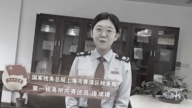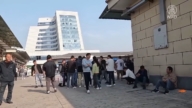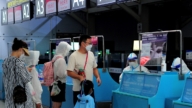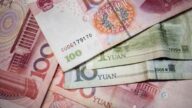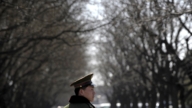【新唐人2012年6月28日讯】学者:中共政权失去合法性
7月1号,中共成立纪念日将到来,质疑中共政权的合法性的话题,再次升温,除了中国大陆各地和香港民众的维权抗议浪潮外,海外学者也从理论上分析指出,中国的维稳经费高于军费充分说明,中共政权即便在自己的法律基础上也失去了合法性。
据《自由亚洲电台》报导,任教于“德国北威州行政管理学院”“警察与刑事学研究院”的政治学博士彭涛表示,如果一个国家的维稳经费高于军费,这就说明这个国家的合法性是有疑问的,因为它不是建立在法律基础上,而是暴力基础上。
彭涛分析说,一个政权和统治权的合法性主要取决于三点,一个是,人民是否认可和顺从这个政权。第二个是,如果认可,又必须有多数人认可。第三个就是当人民承认了这个权力的时候,这个权力才能够获得稳定,才能够继续下去。
彭涛说,中共政权来源的合法性不是现在才存在的问题,而今年受到空前质疑,是因为王立军和薄熙来事件的发生,暴露了中共内部的腐败,暴露了它反人民、反法理的黑暗一面。另一方面,大陆的老百姓也已经到处公开反抗了。
《南早》前记者指总编对其政治审查
香港英文报纸《南华早报》,6月初只以简讯方式报导“六四受害者李旺阳事件”,被外界指责是自我审查之后,6月27号,报社不再续约的外籍记者再次指出, 《南华早报》总编王向伟对他进行政治审查。
最近几天,多家海外媒体先后报导了《南华早报》屡获人权新闻奖的外籍驻华记者慕亦仁(Paul Mooney)不获续约事件,并引述慕亦仁的话说,他的不被续约是因为报导题材敏感。
据《BBC中文网》报导,慕亦仁说,从去年9月收到不续约通知为止,他总共发稿20多篇,但是只被采用了有关成都大熊猫的故事,如采访人在纽约的中国维权律师高智晟的妻子耿和、中国维权律师受到压力的报导,不是被拒绝刊登或者就是缩减内容之后挪到内页。
慕亦仁还说,报社过去经常有外籍编辑在新闻取材上与王向伟发生争执,他自己提出的采访或者报导计划也多次没有被通过。
慕亦仁表示,他不能接受《南华早报》不与他继续合约的说法是由于预算的问题,因为在他未获续约之后,《南华早报》在北京找了几名新的记者。
慕亦仁从23年前开始报导和中国有关的公共事件,并且较为关注中国内地和人权相关的议题,多次获得新闻奖。而今年2月被任命为《南华早报》总编的王向伟,曾任职中共官方媒体《中国日报》,目前王向伟还是吉林省政协委员。
编辑/周玉林
Scholar: The Chinese Communist Regime Has Lost Legitimacy
Shortly before Chinese Communist Party’s (CCP)
anniversary on July 1st, the discussion about its legitimacy is getting more attention.
Mass protests have arisen both in mainland China
and Hong Kong.
The CCP’s budget for “maintaining stability” is even
higher than the military budget, according to analysis by overseas scholars.
This indicates that the CCP has lost
the legal basis for its power.
According to Radio Free Asia, Dr. Tao Peng from North
Rhine-Westphalia, Germany, has discussed that
when the budget spent on maintaining the regime’s power
is more than that spent on its military forces,
the regime’s legitimacy is questionable, as it is not established
on the basis of law, but on the grounds of violence.
Dr. Peng said that the legitimacy of a regime lies
in three aspects.
The first is whether the people accept and comply with it;
secondly, it must be accepted by the majority of people.
Finally, only when the people acknowledge this
authority can it be able to gain and maintain stability.
Peng said that not only is the legitimacy of the CCP a
current issue, it also drew unprecedented attention this year;
particularly after Bo Xilai and Wang Lijun’s cases
exposed the corruption of CCP and its dark side that opposes the people and the law.
Besides that, the people of mainland China
are protesting everywhere.
Hong Kong Journalist Denounces Alleged Censorship
The scandal of the Hong Kong newspaper, South China
Morning Post (SCMP) censoring of its coverage of Li
Wangyang’s suspicious “suicide” in June went further,
as its former journalist said that the chief editor had imposed political censorship on him.
In addition, recently, Paul Mooney, award-winning
journalist from SCMP, hit the headlines of many overseas media.
Paul said that he didn’t get his contract renewed
because he reported on sensitive issues.
According to BBC Chinese, Paul said he got the Notice
of Non-renewal last September. He did over 20 Reports,
but usually only the stories on the giant Pandas in China’s
Chengdu city were published.
Meanwhile, the reports on China’s suppression of
Human Rights lawyers, or an interview with Gao Zhisheng’s wife,
for example, were either rejected, reduced or moved
to less noticed spots.
He also said that his foreign journalist co-workers often
had a hard time with the chief editor regarding contents of the coverage,
and his news plans failed to be adopted many times.
Paul said that he finds it unacceptable that SCMP claims
that the reason for the non-renewal was due to an insufficient budget,
because SCMP hired several new journalists
from Beijing shortly after his non-renewal.
Paul started to report on China’s public issues
23 years ago.
He focused on human rights related issues and has
received awards many times.
Meanwhile, Wang Xiangwei, who served in China’s official
state-run media China Daily, was appointed as SCMP’s chief editor in February of this year.
Wang is also a current member of the Jilin provincial
Chinese People’s Political Consultative Conference.



